Finding the right Tennessee mortgage lender is one of the most important steps in securing a new home, especially in TN’s market landscape. Whether you’re a first-time buyer or a seasoned investor, working with a lender who understands your unique financial profile can make all the difference.
At Defy Mortgage, we provide self-employed individuals, business owners, freelancers, entrepreneurs, and real estate investors with the financial tools they need to succeed, whether their goal is buying their first home, real estate investing, or tapping into their home’s equity. Our expertise is in non-QM loans, such as DSCR loans and P&L loans, designed to help those with unconventional income streams qualify for financing without relying on traditional income documentation or tax returns.
In this blog, we’ll break down the top-rated mortgage lenders in Tennessee and evaluate how each one serves different types of borrowers. We’ll examine their customer service, loan variety, fee transparency, rates, and other characteristics to help you simplify your search in the Volunteer State.
Let’s begin.
Best Mortgage Lenders in Tennessee for 2025
Choosing the right Tennessee mortgage lender is pivotal in securing favorable loan terms and a smooth home-buying experience. Each lender has specific strengths that make them best suited for particular lending situations.
Here are the best mortgage lenders in Tennessee as of 2025:
1. Defy Mortgage
Based in Nashville, Defy Mortgage specializes in non-QM loans that provide self-employed individuals and freelancers with easier access to homeownership and property investment. Our team has deep knowledge of the local market, making it easier to tailor financing solutions to Tennessee buyers. With over 75 customizable loan options, we offer unmatched flexibility. We provide detailed, nuanced support that out-of-state lenders may not.
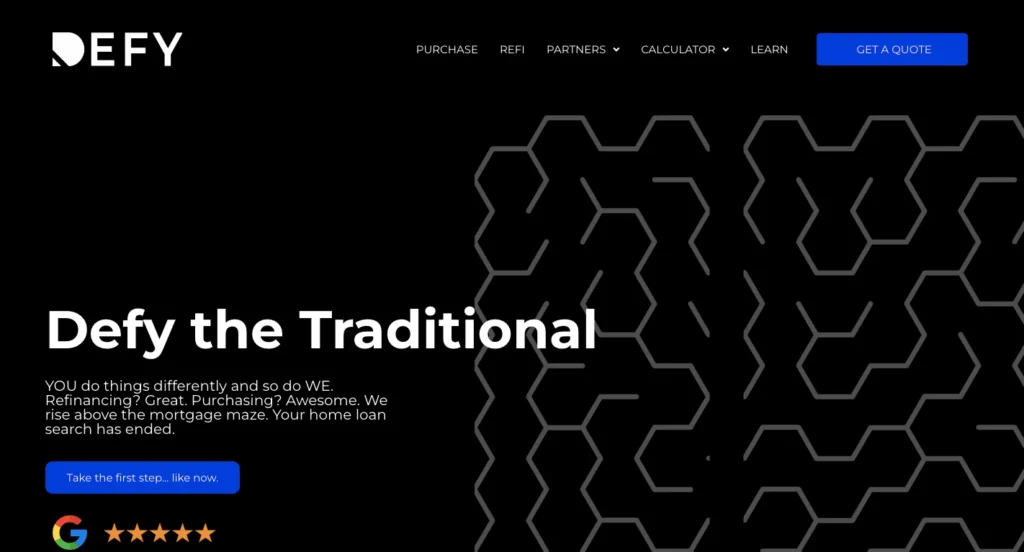
Defy’s non-QM loans do not require W-2s or tax returns, which makes the qualification process quicker and easier. With rental income qualification options and accessibility for foreign nationals without SSN/FICO scores, virtually anyone with sufficient income can apply–regardless of how unconventional their financial background may be. This unparalleled accessibility is all part of Defy’s commitment to a more personal and inclusive lending experience grounded in financial realities.
Loan Options:
- DSCR loans
- Bank statement loans
- Foreign national loans
- P&L loans
- Asset depletion loans
- Jumbo loans
- Cash-out refinance
- Home equity loans and home equity lines of credit (HELOCs)
Pros:
- Over 75 fully customizable non-traditional loan options: As a non-QM specialist, Defy provides 75+ non-traditional loan options for virtually every type of borrowing situation. Each of these can be tailored to fit your needs perfectly.
- Rental income qualification options: Defy’s core offering, DSCR loans, lets you use your property’s income instead of your own to secure financing and ideal loan terms, such as better rates and loan-to-value (LTV) ratios. This allows even those with less-than-perfect credit to qualify for an investment property mortgage, with a potentially boosted ROI depending on their chosen property’s cash flow performance.
- Based in Tennessee: With its headquarters in Nashville, Defy is uniquely positioned at the heart of Tennessee’s vibrant real estate market, able to provide borrowers with personalized insights and support tailored to the needs of Tennessee homebuyers and investors.
- Fast and reliable pre-approvals: Defy has a simpler and quicker pre-approval process, with fewer documentation requirements compared to traditional lenders.
- Interest-only options: Defy offers interest-only mortgage options with loan amounts up to $10 million and up to 85% loan-to-value (LTV), reducing the initial cost of your mortgage. Our loan options feature fixed interest-only periods of 5, 7, or 10 years, followed by 30- or 40-year amortization schedules.
- Dedicated support throughout the mortgage loan process: Defy Mortgage offers dedicated and personalized support throughout the client’s mortgage journey.
Cons:
- No physical branch locations: While Defy Mortgage is headquartered in Nashville, Tennessee, it operates primarily as a digital-first lender.
Best For:
Defy Mortgage is an excellent choice for Tennesseans who are self-employed, freelancers, real estate investors, or individuals with non-traditional income sources. With an extensive range of non-QM loan products and a commitment to personalized service, borrowers are treated to a level of flexibility and customizability that few other lenders can match.
Defy’s mortgage experts have extensive knowledge of the Tennessee market and can provide tailored support throughout your mortgage process.
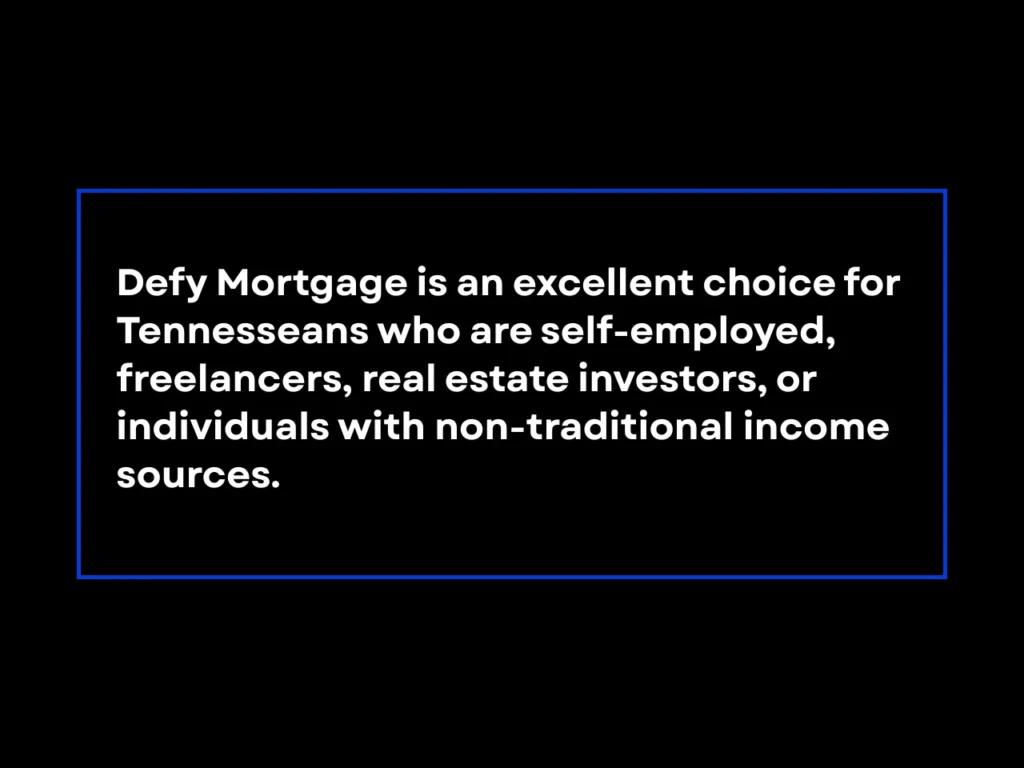
2. Garden State Home Loans
Established in 2011 and now operating as a division of OceanFirst Bank, Garden State Home Loans has funded over $5.6 billion in loans. Recognized by the Better Business Bureau as an approved lender, Garden State Home Loans has a full suite of mortgage products for their borrowers.
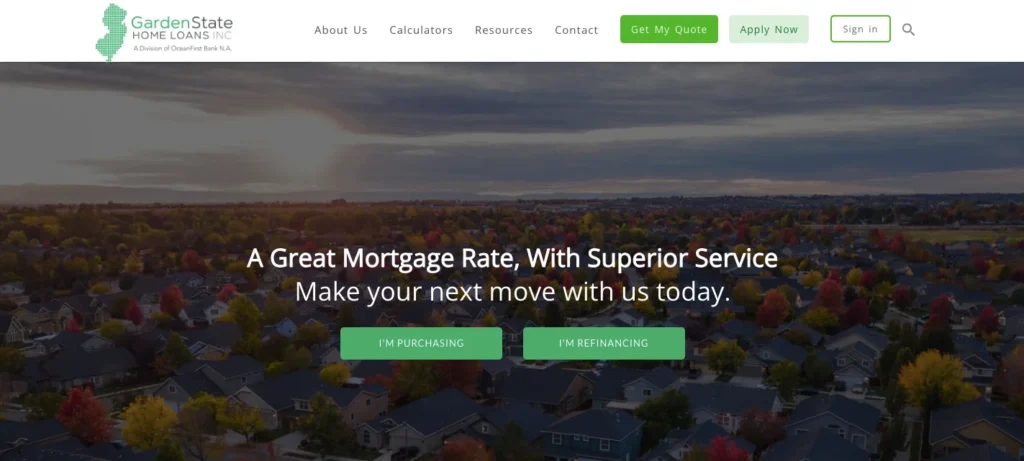
Loan Options: Conventional, FHA, VA, USDA, DSCR, jumbo up to $2M, FHA 203(k) and Fannie Mae HomeStyle renovation loans, cash-out, and streamline refinance options.
Pros:
- Diverse loan offerings: Garden State Home Loans provides a comprehensive range of mortgage products, including conventional, FHA, VA, USDA, jumbo loans, and renovation loans like FHA 203(k) and Fannie Mae HomeStyle.
- Digital application process: Borrowers can complete the entire mortgage application online, with features like instant loan estimates and a secure portal to track application progress.
- Extended availability: The company offers customer support seven days a week.
- Strong customer satisfaction: Garden State Home Loans has been rated 5.0 stars on the customer experience platform Birdeye, based on over 2,400 reviews.
Cons:
- Limited physical branch presence: Garden State Home Loans’ primary branch is located in Cherry Hill, New Jersey, with limited physical presence elsewhere.
- Limited in-person support: Garden State Home Loans can only offer limited in-person support outside of their NJ branch in the form of their sponsored loan officers.
- Interest rates and closing costs are not publicly listed: You can only learn the rates that they offer upon signing up with them.
3. Tomo Mortgage
Tomo Mortgage, a fintech startup founded in 2020 by former Zillow executives Greg Schwartz and Carey Armstrong, emphasizes a tech-forward approach to eliminate traditional barriers and inefficiencies. While its platform provides fast pre-approvals and no lender fees, its loan menu is narrower and not suited for all borrower types.
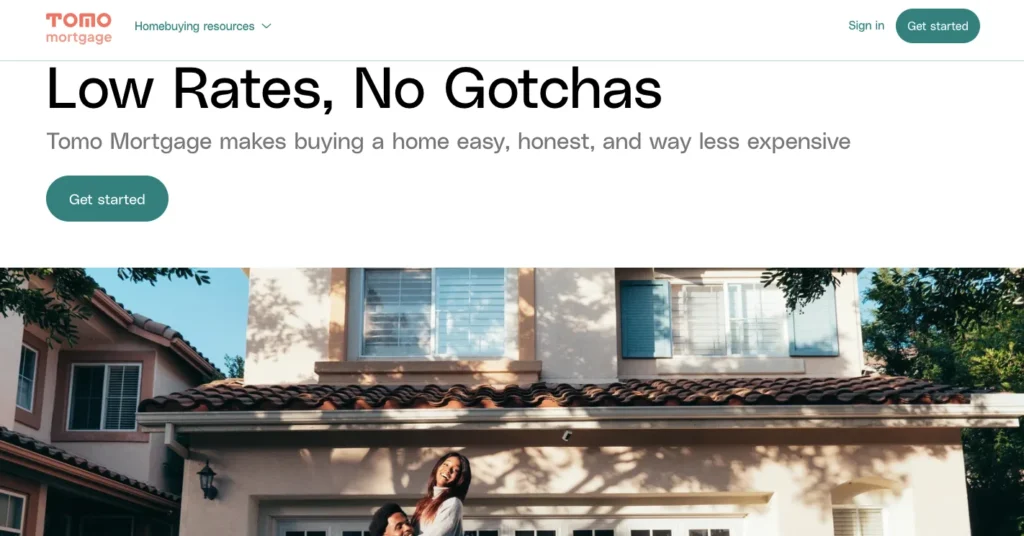
Loan Options: Conventional, jumbo, FHA, and VA loans.
Pros:
- No lender fees: You will not be charged for origination, processing, or other lender fees, potentially saving you an average of $2,000 at closing.
- Quick pre-approval process: Borrowers can receive a pre-approval in under 15 minutes, facilitating a faster home-buying process.
- High on-time closing rate: Tomo Mortgage boasts a 98% on-time closing rate, significantly higher than the industry standard rate of 40%.
- Transparent pricing: Tomo Mortgage displays its mortgage rates online, allowing borrowers to make informed decisions.
Cons:
- Limited loan product variety: Tomo Mortgage does not offer government-backed loans such as FHA, VA, or USDA loans, which may limit options for some borrowers.
- No refinance options: Since Tomo Mortgage focuses on purchase loans, it does not offer any refinancing options.
- Short rate lock period: The standard rate lock period is only 30 days, which might not be sufficient for borrowers who need a longer period to finalize their home purchase.
4. Chase Home Lending
As a national bank, Chase offers a wide range of mortgage products with the backing of a trusted financial institution. It offers a variety of mortgage types and in-person services, but the experience may feel less personalized compared to more nimble, specialized lenders.
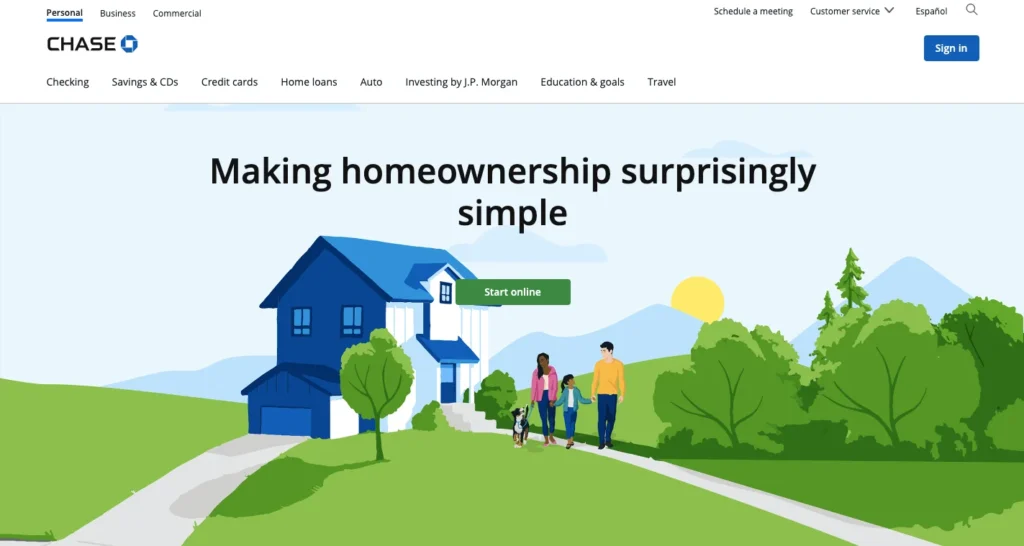
Loan Options: Conventional, FHA, VA, jumbo, and refinancing options.
Pros:
- Extensive branch network: Access to over 4,700 branches nationwide, each providing comprehensive in-person support and services.
- Homebuyer grants: Chase offers homebuyer payment assistance grants of up to $7,500 to help cover closing costs and down payments for eligible borrowers in over 6,700 neighborhoods nationwide.
- Educational resources: Chase also provides free access to a variety of tools and resources, including an affordability calculator, a mortgage education center which offers homebuyer education classes, and personalized loan guidance.
Cons:
- Potentially higher fees: Some borrowers have reported higher fees compared to online-only lenders.
- Limited loan customization: While Chase offers a wide variety of loan products, some borrowers may find the customization options less flexible compared to specialized lenders.
- Limited availability in some states: Although Chase has locations throughout all of the lower 48 states, these branches are mostly concentrated around specific regions.
5. First Rate Mortgage
Based in Missouri, First Rate Mortgage serves Tennessee and several other states. They provide responsive service and fast approvals but focus mainly on conventional borrower profiles.
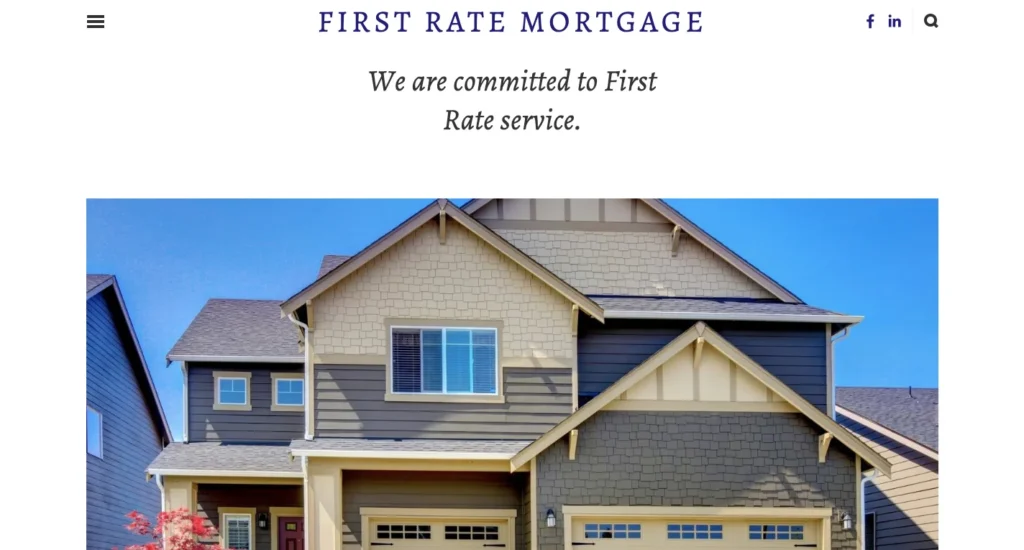
Loan Options: Conventional, FHA, VA, USDA, Adjustable Rate Mortgages (ARMs), reverse mortgages, jumbo and super jumbo loans, and FHA 203(k) renovation loans.
Pros:
- Personalized customer service: Several reviews praise First Rate for their excellent customer service, providing expert support and guidance every step of the way.
- Fast pre-approvals: First Rate Mortgage can get you pre-approved in only 72 hours.
- Digital application process: You can apply for a mortgage with First Rate completely online, as well as conduct a hybrid e-closing with a digital signature.
Cons:
- First Rate Mortgage is not licensed in every state.
- Non-traditional borrowers may prefer Defy’s flexible, alternative lending options.
6. Zillow Home Loans
Launched in 2018, Zillow Home Loans was established to streamline the mortgage process for the homeowner who prefers to use Zillow’s real estate search platform. While convenient, their loan options are basic, and reviews on transparency and service vary.

Loan Options: Conventional, FHA, VA, and refinancing options.
Pros:
- Integration with property listings: As part of Zillow Group, Zillow Home Loans seamlessly integrates with Zillow’s extensive property listings, allowing borrowers to browse homes and initiate the mortgage process within the same platform.
- Various online tools and resources: Similarly, Zillow Home Loans offers mortgage calculators, affordability assessments, checklists, and other resources, each fully integrated into its mortgage platform.
- Competitive rates: Zillow offers below-average mortgage rates, according to Bankrate.
Cons:
- No home equity loans or HELOCs: Zillow Home Loans does not offer either of these products, but they do offer refinancing loans.
- Lack of transparency in fee structure: Zillow Home Loans does not fully disclose its rates and fees on its website.
- Limited loan customization options: Buyers who value convenience and integration with Zillow’s property listings. Borrowers who need a lender that understands niche lending—like DSCR or bank statement loans—may find more appropriate options with Defy.
- Low Trustpilot rating: Zillow Home Loans has been rated 2.5 stars out of 5 on online review site Trustpilot, based on ratings from 45 reviews.
How to Choose the Right Mortgage Lender in Tennessee
Choosing a lender is especially critical if you’re a first time home buyer Tennessee resident who needs extra guidance through the process. You consider whether a lender’s approach, offerings, and specialization align with your expectations. Here’s how you can find a great choice that fits both your goals and your circumstances:
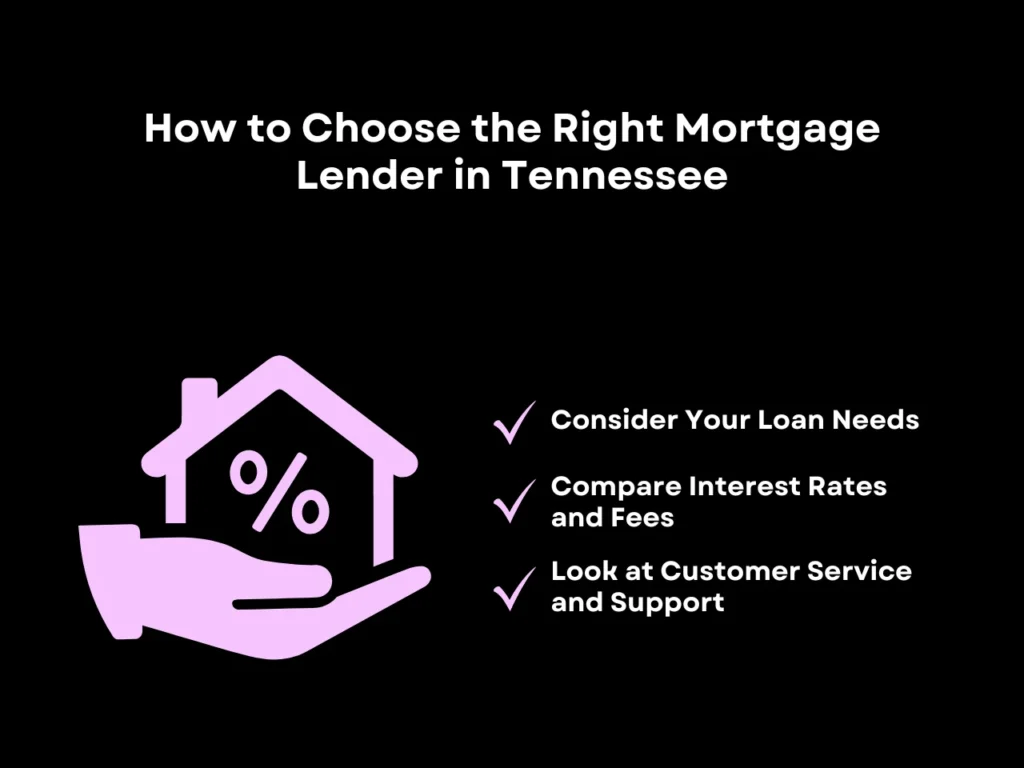
Consider Your Loan Needs
Before searching for a lender, it’s often best to establish what kind of loan is best for your financial goals. Different lenders often focus on particular loan types more than others. Some may specialize in home loans, for example, while others may focus on investment property loans.
Compare Interest Rates and Fees
Once you have created a shortlist of Tennessee mortgage lenders to choose from, you can narrow down the selection further by ranking them according to the interest rates and fees of the loan options that you’re interested in. Make sure to assess both the interest rate and the Annual Percentage Rate (APR).
Look at Customer Service and Support
The quality of customer service can make or break your mortgage experience. Set up a consultation with each lender on your shortlist to get a sense of how they communicate. Are they attentive, timely, and willing to explain real estate jargon? Personalized, responsive service often indicates that they will stay present from pre-approval to closing.
Ask specific questions to test their knowledge of your situation. For example, do they have experience working with your household income type or the neighborhood you’re targeting? Can they explain how local market trends might affect your rates or loan terms? Are they able to tailor their offering to your needs?
A strong lender will be able to provide clear, verifiable answers and demonstrate familiarity with the Tennessee market. Once you’ve identified a lender who meets your criteria and makes you feel confident in their expertise, it’s time to move forward.
Tennessee Mortgage Market Outlook for 2025
In 2025, we are seeing marginal price growth slowdowns and mortgage rate drops in the Tennesse mortgage market. Let’s take a deeper look at the forces at play here in the state:
Interest Rates and Affordability
Like in many places across the US, Tennessee mortgage rates have been gradually declining from their highs in the past two years. 30-year fixed-rate conventional mortgages currently settle at around 6.942% for a single-family primary with a FICO score of 720–significantly lower than their 2023 peak of 8.14%. The APR for a loan of this configuration is 6.946%.
However, economists predict that there will be no major rate drops in the immediate future. In Q3 2025, the Mortgage Bankers Association (MBA) projects a rate of 6.8% for a 30-year fixed rate on a single-family primary with a 720 credit score, which will incrementally decrease to 6.7% in Q4. It remains to be seen whether this trend of decline will continue into 2026, with some experts cautioning that current economic conditions may even cause volatility in the mortgage rate for the next few months.
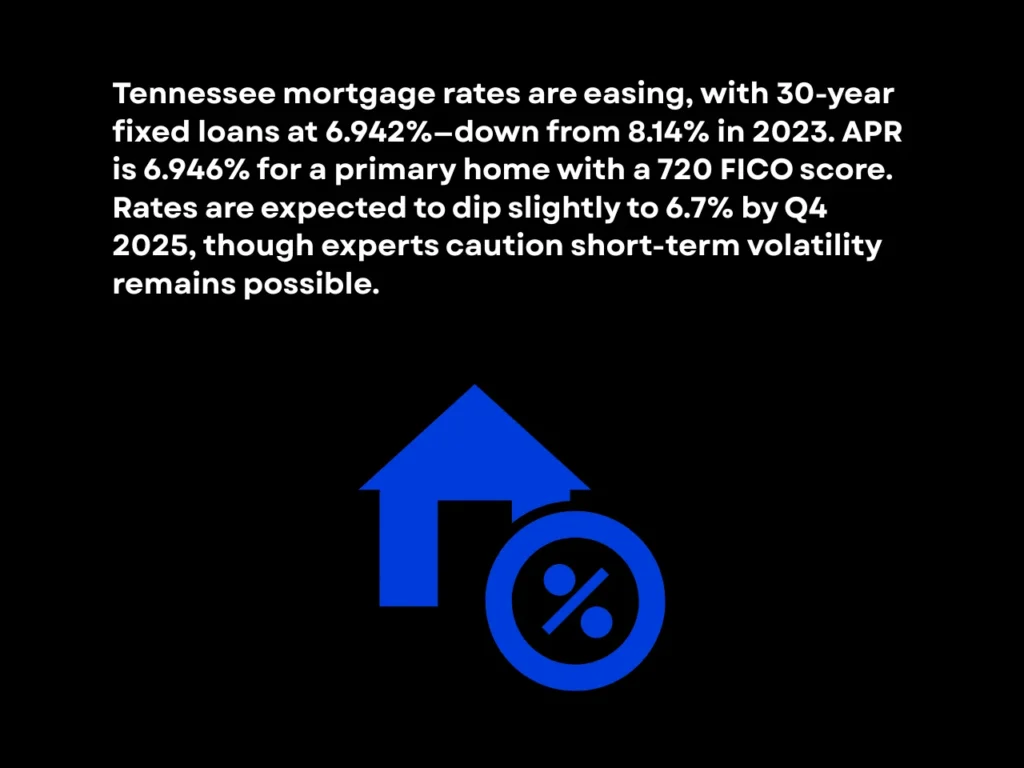
Housing Supply and Demand
According to Redfin, Tennessee experienced a notable increase in housing inventory throughout 2024, peaking in October 2024 at over 40,000 units–a year-over-year increase of 21%. This number dropped sharply to 35,000 units by January 2025, but has recently started to trend back up. Market competitiveness has gotten progressively lower since its 2022 high, with 22.7% of homes selling with price drops.
This can be good news for buyers looking for more affordability, as decreasing demand and increasing supply often work together to keep prices low in certain areas where sellers are willing to sell below list price. The median sale price currently sits at $380,000, which is a 3.3% decrease from the December 2024 price of $393,000. However, some experts predict that Tennessee home prices will grow 3.7% through 2025.
Top Tennessee Cities for Homebuyers in 2025
Several Tennessee cities stand out as ideal places to buy a home because of their affordability, growth potential, and quality of life. Let’s take a look at the strengths of each one:
- Knoxville: Knoxville continues to be a standout in Tennessee’s real estate landscape, with its steady appreciation and balanced market. As of February 2025, the median sale price in the city has risen to $337,905, a steep rise of 38.7% from its February 2022 median sale price of $250,000. Knoxville’s thriving job market and high quality of life consistently attract both local and out-of-state buyers. The city has been praised for involving its residents in its urban planning decisions, which are proving to be very effective at meeting the growing needs of its communities.
- Nashville: The capital of Tennessee remains a top contender for the best cities to move to in Tennessee. As one of the fastest-growing cities in the US, home prices are a little more expensive, selling for a median price of $470,000, but consistently high demand guarantees steady appreciation for the foreseeable future. Nashville, the Music City, boasts a diverse demographic appeal that gives it a vibrant cultural scene and a strong job market, making it one of the most resilient markets in the state.
- Chattanooga: Topping U.S. News’ list of Best Places to Live in Tennessee in 2025, Chattanooga may not be as developed as Nashville or Knoxville, but it makes up for it with special characteristics that give it competitive value for money. Homes in Chattanooga sell for a median price of $330,000, offering an affordable point of entry for both homebuyers and investors. Chattanooga also provides scenic surroundings, a wide variety of outdoor activities, and a startup-friendly economy.
Tennessee Mortgage Lender FAQ
What types of loans does Defy Mortgage offer for Tennessee homebuyers?
Defy Mortgage provides a range of non-traditional loan options for Tennessee homebuyers, including bank statement loans, P&L loans, jumbo loans for homes above purchase price limits, and asset depletion loans, with options for foreign nationals who do not have a US Social Security number or credit score.
Can I get a DSCR loan through Defy Mortgage in Tennessee?
Yes, Defy Mortgage specializes in DSCR loans. Debt service coverage ratio loans (DSCR) are ideal for real estate investors focusing on property cash flow, as their terms get better with your selected property’s rental income performance.
How do mortgage interest rates in Tennessee compare to national rates?
Tennessee’s mortgage rates are projected to average between 6.5% and 7% in 2025, aligning closely with national trends. These rates are expected to apply to both popular cities like Knoxville and Nashville, as well as to more sparsely populated rural areas.
What credit score do I need to qualify for a mortgage loan in Tennessee?
While requirements vary by lender, a minimum credit score of 620 is generally needed for conventional loans. Other loan types, such as FHA loans, may accept lower scores.
Is now a good time to buy a home in Tennessee in 2025?
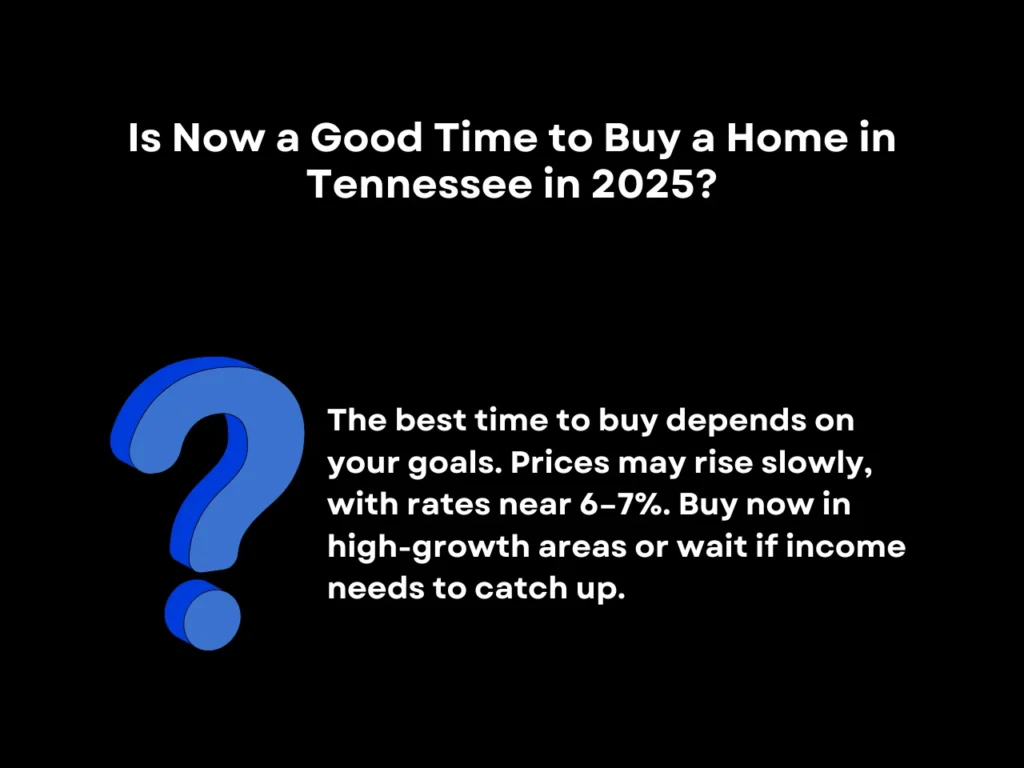
The best time to purchase a home will ultimately depend on your personal goals and the resources available to you. However, we believe that Tennessee home price growth is likely to continue. Mortgage rates, on the other hand, are projected to stay within the 6% to 7% range throughout the year. It can be advantageous for some to purchase soon, especially in high-growth areas where price growth slowdowns will be less likely.
Key Takeaway
Finding the right lender means aligning your financial situation with a partner who understands your goals. If you’re self-employed or have a unique income stream, Defy Mortgage offers flexible solutions and expert guidance you won’t find at traditional banks.
As your trusted Tennessee mortgage lender, Defy Mortgage offers flexible solutions and expert guidance you won’t find at traditional banks. If you’re ready to explore your mortgage options, don’t hesitate to reach out by emailing us at team@defymortgage.com, or calling us at (615) 622-1032.







